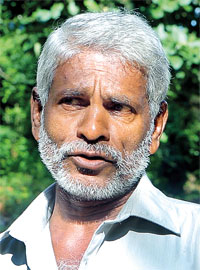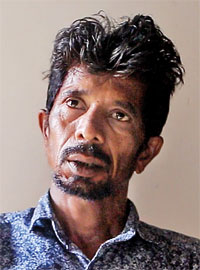News
Only despair grows in this model organic village
Although Laggala-Pallegama in the Mahaweli F Zone was declared a ‘sustainable development model village for organic agriculture’ by the Mahaweli Ministry in 2020, the experiment had failed

Nawarathna Banda: Little hope for this season's harvest
But Laggala-Pallegama in the Mahaweli F Zone had been declared a ‘sustainable development model village for organic agriculture’ by the Mahaweli, Agriculture, Irrigation and Rural Development Ministry in 2020, even before the Government imposed the chemical fertiliser ban last year.
So why are farmers still reliant on agrochemicals? In what might be a learning experience for similar initiatives in future, the experiment had failed.
The original Laggala town was evacuated in 2019 since it was swamped by the waters of the Kalu Ganga reservoir in the massive Moragahakanda and Kalu Ganga Multipurpose Irrigation Development Project. The new town was named a ‘green city’ and nearly 1,500 acres are used for cultivation.
“There are nearly 2,000 farming households,” said Hemantha Jayasinghe, Residential Project Manager Mahaweli Authority. “During the relocation, we gave them farming lands and also asked them to produce compost. But most farmers didn’t do so and continued with chemical fertiliser.”
When the ban came, as they hadn’t manufactured organic alternatives in time, farmers in the Laggala model organic village were also hit.
In the first season after people were evacuated from the previous Laggala village–before the agrochemicals ban–the Mahaweli Authority had provided organic fertiliser. “And we had a separate yard to distribute compost for those who couldn’t produce fertiliser,” Mr Jayasinghe said. “The farmers had received KCI (potassium chloride), the most common paddy input for paddy, and bio liquid fertiliser through a private fertiliser company before the ban.”
The State had also given out dry rations to the community over the last three years, anticipating a yield decline during the switch from agrochemicals to organic inputs. This had cost nearly Rs 9mn. “In the meantime, we had advised the farmers to prepare their farmlands,” he continued.
Some farmers had harvested a higher yield after applying organic fertiliser. The Mahawelia Authority has now started research into soil issues so it can provide better advice on how to produce organic fertiliser, Mr Jayasinghe said.
Statistics from the Department of Agrarian Development show that after the chemical fertiliser ban just 556 farmers out of 2,000 farmers in Laggala had received organic compost. Farmers in the Laggala-Pallegama area had not got KCI, nano nitrogen, or bio liquid fertiliser necessary to continue farming, fertiliser distribution progress figures reveal.
However, the farmers are not happy after converting the village into a fully organic model and complained that the “overnight” ban on chemical fertiliser last year hit their production.

H.M. Ratnayake, Treasurer of the Wijeya Farmers' Association in New Laggala Town
“The lack of fertiliser has had a significant impact on the farming culture in the area,” said 62-year-old Nawaratne Banda, expressing disappointment. “We haven’t started working in our farmlands yet. We don’t have experience in applying complete organic fertiliser.”
“We received electricity to the village only recently,” Mr Banda said. “There was no proper road and we had faced many difficulties when taking an emergency patient to the hospital. However, we somehow survived because of the farming culture we had. Now all is gone.”
Mahaweli Authority officers had supplied a limited amount of compost fertiliser but this wasn’t sufficient, Mr Banda explained. “We have not sown here yet,” he pointed out. “Farmers in the area are not confident of a proper harvest this time. This soil is not accustomed to organic fertiliser at all and we have no experience of using that fertiliser.”
Since resettlement, they had been waiting three years to cultivate their new farmlands. The unexpected chemical fertiliser ban had plunged them into a serious crisis, said H.M. Ratnayake, Treasurer of the Wijeya Farmers’ Association in New Laggla Town.
“We can’t think about farming since we don’t have any fertiliser,” he maintained. “We don’t have any other source of income,” said Ratnayake, a father of two children who is now struggling to make ends meet on his daily wage.
He said nearly 60 families from Kambarawewa village had been relocated in the New Laggala Town three years ago, when constructing the Kaluganga Dam. “When we were growing in our previous lands, we were self-sufficient. We had everything, but now we must rely on government officials. We have no choice but to ask for water and fertiliser for our lands because we have no other source of revenue,” he explained.
Ratnayke claimed most farmers had not received organic fertiliser or the Rs. 7,500 allowance provided by the Government for organic fertiliser production.
“We don’t have the freedom to carry out our occupation which we had in the previous village,” he said. “Despite the availability of education and transportation, we are unable to continue our livelihood as we wish.”
Farmers who once planted paddy, finger millet and manioc now have to “wait for everything”.
The best way to say that you found the home of your dreams is by finding it on Hitad.lk. We have listings for apartments for sale or rent in Sri Lanka, no matter what locale you're looking for! Whether you live in Colombo, Galle, Kandy, Matara, Jaffna and more - we've got them all!

